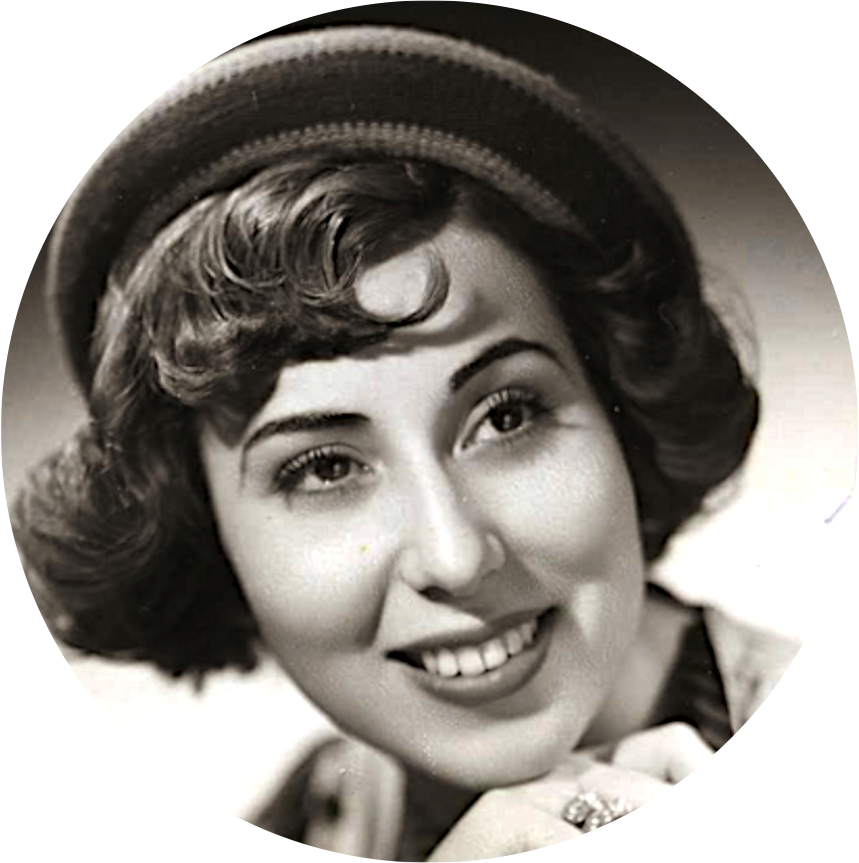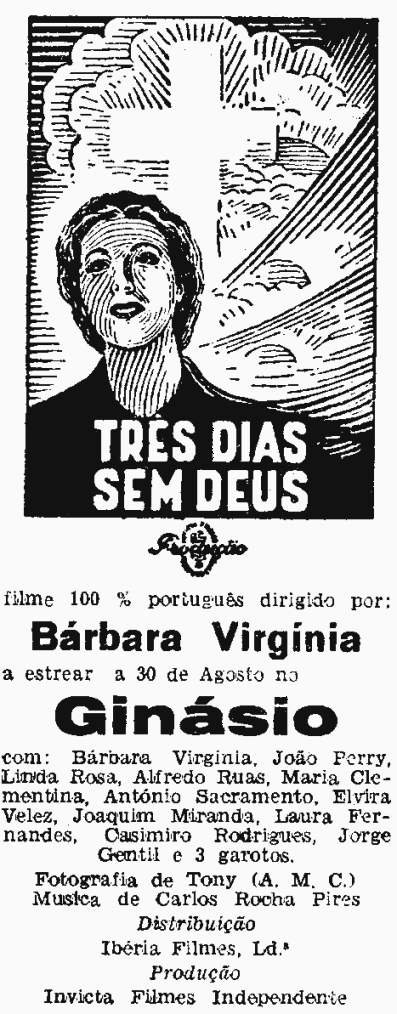

Bárbara Virgínia, the artistic name of Maria de Lourdes Dias Costa, was born on the 15th of November of 1923, in Lisbon.
At the tender age of 15, she was already one of the most promising voices of the Emissora Nacional de Radiodifusão, the Portuguese public national radio broadcaster. In parallel, besides having performed as a classically-trained ballerina in the prestigious National Theatre D. Maria II, in Lisbon, Virgínia also collaborated with the female-fronted and oriented fashion/arts magazine Modas e Bordados, under the supervision of Maria Lamas.
In 1943, she finished her studies at the National Conservatory and subsequently became a regular actress at the Trindade Theatre, where she played opposite Maria Barroso. Having further integrated the theatrical company of Alves da Cunha, she was a member of the cast in the operetta Sua Majestade o Amor (Her Majesty Love), directed by Silva Tavares.
Soon after, she transitioned to cinema. In 1945, she was an actress in Sonho de Amor, by Carlos Porfírio. Two years later, in 1947, she integrated the cast of Aqui Portugal, by Armando de Miranda, a film where she once again crossed paths with Maria Barroso.
Concomitantly, her career´s ascension reached its peak in 1946, when she became the first Portuguese female filmmaker. The film, Três Dias Sem Deus (Three Days Without God), is based on Mundo Perdido, a literary work by writer Gentil Marques, and narrates the story of a girl, played by Virgínia herself, whose first elementary teaching assignment leads her to a remote lost village, in the middle of a mountain. The film plays as homage to all of those who, in complete solitude, struggle for their lives, standing against slander and gossip with serenity.
With Três Dias Sem Deus, at only 22 years of age, Virgínia not only became the first woman director in Portugal, but also the first woman to have a film selected for the Cannes Film Festival, whose first edition was also held in 1946.
She worked as a radio announcer as well, having participated in the popular radio show Comboio das Seis e Meia, directed by Igrejas Caeiro.
In 1952, following an invitation by an entrepreneur, she travelled to Brazil to sign a contract with TV Tupi – a pioneering Brazilian television network – and ended up working there throughout the remainder of her career, always enjoying great success.
Having lived in Brazil ever since, Bárbara Virgínia died in the city of São Paulo, on the 8th of March of 2015.
*****
Bárbara Virgínia, nome artistico de Maria de Lourdes Dias Costa, nasceu a 15 de Novembro de 1923 em Lisboa. Com apenas 15 anos era já umas das vozes promissoras da então "Emissora Nacional”. Bárbara Virgínia chegou a atuar como bailarina clássica, no Teatro Nacional D. Maria II, em Lisboa, e colaborou na revista Modas e Bordados, dirigida por Maria Lamas. Em 1943 concluiu os estudos no Conservatório e foi actriz no Teatro da Trindade, onde contracenou com Maria Barroso. Fez parte da companhia teatral de Alves da Cunha, do elenco da opereta “Sua majestade o amor”, de Silva Tavares.
Em 1945 participou no filme "Sonho de Amor", de Carlos Porfírio e em 1947 fez parte do elenco de "Aqui Portugal", de Armando de Miranda, filme onde voltou a cruzar-se com Maria Barroso.
Foi a primeira realizadora portuguesa de cinema e também a primeira mulher a apresentar um filme no Festival de Cannes, em 1946. O filme, "Três dias sem Deus", é baseado na obra literária "O Mundo Perdido", do escritor Gentil Marques e relata a história de uma rapariga que pela primeira vez vai exercer o cargo de professora primária numa aldeia perdida no meio de uma montanha. O filme pretende homenagear todos aqueles que, completamente sós, lutam pela vida, enfrentando a maledicência com serenidade. Com apenas 22 anos, tornou-se na primeira mulher portuguesa a assumir a realização de um filme, função que acumulou com a representação.

Também foi locutora de rádio, tendo participado no popular programa radiofónico “Comboio das seis e meia”, realizado por Igrejas Caeiro.
Em 1952, por convite de um empresário brasileiro, viajou para o Brasil e assinou um contrato com a TV Tupi, que foi pioneira da televisão naquele país, e lá continuou a trabalhar sempre com êxito.
Morreu dia 8 de Março de 2015 em São Paulo, Brasil.
References: